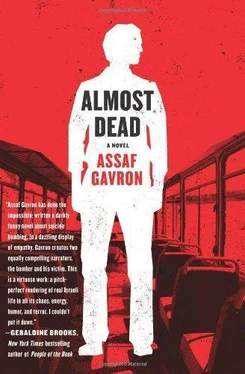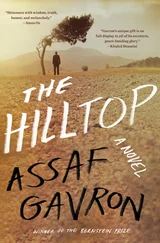Lucky , I was thinking as I left, with the holdall slung over my shoulder, no phone, no way of contacting the world, not knowing where I was heading or where I would sleep, you’re so very, very lucky . Why had I made the decision, on the spur of the moment, on this day of all days, to call Lulu? Someone up above had taken me out of Al-Amari today. Grandfather Fahmi was protecting me, I was sure of it. And he would keep watching over me. And then I told myself in Bilahl’s voice, for the second time that day: stop looking at the full half of the glass, little brother. Pull yourself together. Be careful.
Shuli died on a Wednesday, thirteen weeks after the attack. I’d come to Jerusalem for my thirteenth and last group therapy meeting. The doctors were unsurprised. The machines, they said, could maintain a certain amount of body function, but they couldn’t make the brain live. ‘What about the ones who stay in comas for years?’ I asked. I was in shock. I seemed to be sitting on the floor. ‘The ones who wake up after seventeen years and ask for a Pepsi?’ ‘That’s a different story,’ they said, and didn’t elaborate.
The night before I hadn’t been able to sleep and the morning had passed slowly and foggily. When I stepped on to the Little No. 5 I felt a hideous breaking wave of nausea and stumbled off and threw up on the pavement. For a long time I sat on a bench and sipped water with a head full of noise and then I took a taxi to Jerusalem. The air was heavy and not easy to breathe. The machine didn’t have Twixes. On the top floor, Shuli’s bed was not in its place. I asked the nurse what had happened, but I already knew that she was going to say what I’d been imagining for months. The nurse said, ‘Shuli? I’m sorry. She passed away.’ I went down on my knees and cried without stopping, until doctors came, and then I felt hands on my shoulders. They were the hands of Alon, the chef from the King David Hotel. He walked me to a bench outside the hospital and we sat there for a long time, silent, smelling the pine trees, looking at the Jerusalem hills. I didn’t say a word in group therapy either, and no one tried to make me. The next Wednesday I didn’t bother to come at all. I only came back to Jerusalem for the funeral. The Mountain of Rest cemetery, where we’d first met on a stormy day three months earlier. I felt as alone as I’d ever felt in my life. It was a bright spring day, and between her grave and Guetta’s there were two rows of fresh graves, marking the weeks that had passed, the unostentatious, steady labour of death. I didn’t make it more than halfway through the ceremony before running out of the cemetery, carrying in my ribcage a leaden mass of grief which would make breathing an effort for weeks afterwards.
In the mirror: a man aged thirty-three and a third, beginning to recede. Some grey hairs. A small paunch, scarcely there, really, actually not a paunch but a temporary bulging of the stomach. Hairs in the ears and nose. Red eyes with heavy lids.
‘What are you looking at?’ Duchi’s voice from behind me. I shifted my eyeline to an angle where I could see her in the mirror. She was standing in the doorway in a white robe, her wet hair darkened almost to black. Her eyes were smirking. ‘At this handsome man?’ She came and hugged me from behind. ‘Not so handsome,’ I said. ‘You’re still cute,’ she said, and nuzzled her soft cheek against my back. ‘You think so?’ I frowned my eyebrows down and gave myself a glance in three-quarter profile. It looked a bit better that way. ‘Obviously unbearable sometimes,’ she said, ‘but I still remember the cute Croc, and I know he’ll be back.’
Duchi tried so hard to be good to me. She was patient and solicitous and accepted the sleepless nights and the jumpiness and lack of concentration they left in their wake. We hardly argued. It was so strange, so unsettling, that I had this weird feeling something was missing. I asked her whether she’d taken anything out of the flat, changed the furniture around or something. But it was the arguments. In bed one night, when I asked her why it hadn’t been like this before, why she was suddenly so nice, she gave me her profound look and let out a brief bark of hollow laughter.
‘Dimwit. You really think I’ve changed?’
‘You haven’t?’
‘Of course not. It’s you.’
‘Me?’
‘You’ve stopped arguing about every petty thing, and looking for reasons to fight because you’re under pressure all the time…’
‘OK, OK, I get it.’
‘Like, now there are other things.’ She didn’t conceal the expression on her face. ‘You’re…difficult. You can be cruel and self-centred and you don’t sleep, and I still don’t see how the cigarettes can be helping.’ I looked at her. ‘OK, not cruel,’ she said. Some seconds elapsed. ‘Maybe a little,’ she said.
Since September 11th the word ‘wedding’ had resurfaced only once. Duchi’s brother Voovi had mentioned it during a dinner at ours. It sort of fell out of his mouth like a fledgling falling out of a nest, just toppled off his tongue on to the floor, where it collapsed.
But I couldn’t bring myself to abandon the Guetta investigation. I recruited Bar to help. I call it an investigation because I have no other word for it, but it was hardly that — Inspector Almaz had in fact classified it as ‘a case not worth investigating’.
The first thing you notice when you meet Bar is his loose posture. He’s a loose guy: thin, not so tall, always wearing a shabby baseball cap, a size too big, on his shaven head. He has small ears and these incredibly bright blue eyes. He wears a permanent five o’clock shadow to compensate for the premature baldness. The timing was good for him. Work bored him and even the numerology was starting to pall. He’d served in military intelligence, I don’t know in exactly what capacity, but I trusted him. And besides (I discovered later) he’s a big Hercule Poirot fan.
He transferred the contents of Guetta’s Palm to his computer and started scanning it. After about an hour he sent me an email with these details:
On the morning of his death Guetta had a meeting at eight: BMW. Coffee Bean, Yehuda Maccabi Street. A mobile phone number.
In Guetta’s address book under B, Binyamin Warshawski is listed next to the same mobile phone number listed for the meeting above. Almost certainly, the ‘BMW’ mentioned in the note about the meeting is Warshawski’s name.
That number is disconnected. The phone company says the number is not in use. Under pressure from this investigator, the customer service representative told me it was a withheld number, but admitted that it was cancelled by the customer. The date of cancellation was a few days after the meeting.
The phone book lists three Binyamin Warshawskis. One on his own, two with a partner. One lives in Tel Mond, two in Tel Aviv.
Giora Guetta’s nickname was ‘Gigu’.
Two days after his death, Guetta was supposed to collect a new credit card from his bank in Jerusalem.
In numerology, Giora Guetta from Jerusalem = a very dark and complicated affair = a meeting in Tel Aviv. I swear this is true: the sum is 845 for all three sentences.
The guy’s a genius, I thought. All this after an hour’s work. I made an investigation team appointment in ten minutes’ time at the falafel stall downstairs.
‘Not bad for an hour,’ I said in admiration.
‘Yeah, but it’s easy. When you’re scanning soft material, you find ninety per cent of the good stuff quickly. The problem is finding the remaining ten per cent.’
‘Soft material?’
‘Soft material’s the stuff you don’t expect to be searched or examined. Normal citizens, like you and me, accumulate stuff and lists and diaries without worrying about security. The opposite of coded or classified material you get in organisations.’
Читать дальше












